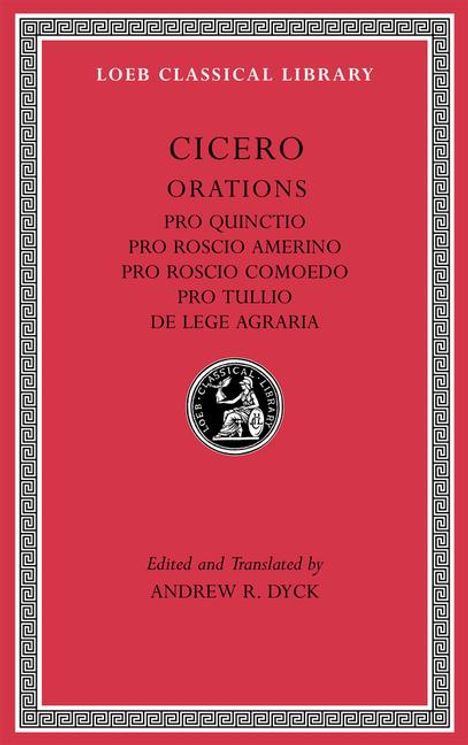Cicero: Pro Quinctio. Pro Roscio Amerino. Pro Roscio Comoedo. Pro Tullio. de Lege Agraria, Gebunden
Pro Quinctio. Pro Roscio Amerino. Pro Roscio Comoedo. Pro Tullio. de Lege Agraria
(soweit verfügbar beim Lieferanten)
- Herausgeber:
- Andrew R Dyck
- Übersetzung:
- Andrew R Dyck
- Verlag:
- Harvard University Press, 06/2025
- Einband:
- Gebunden
- Sprache:
- Englisch
- ISBN-13:
- 9780674997677
- Artikelnummer:
- 12121983
- Umfang:
- 624 Seiten
- Gewicht:
- 426 g
- Maße:
- 173 x 119 mm
- Stärke:
- 33 mm
- Erscheinungstermin:
- 24.6.2025
- Hinweis
-
Achtung: Artikel ist nicht in deutscher Sprache!
Klappentext
"Cicero (Marcus Tullius, 106-43 BC), Roman lawyer, orator, politician, and philosopher, of whom we know more than of any other Roman, lived through the stirring era that saw the rise, dictatorship, and death of Julius Caesar in a tottering republic. In his political speeches especially and in his correspondence we see the excitement, tension, and intrigue of politics and the part he played in the turmoil of the time. Of about 106 known speeches, fifty-eight survive intact or in large part; together with his rhetorical treatises, they have long served as models for orators, advocates, and others. This volume contains four speeches from Cicero's pre-consular, and one from his consular period. Pro Quinctio, his earliest surviving defense (81), handles a complex commercial dispute deftly and in loftier style than usual in such cases. Pro Roscio Amerino, his first criminal case (80), is a successful defense on a politically fraught charge of parricide. Pro Roscio Comoedo (72 or 71) defends a famous actor and old friend involved in a financial dispute, with suitably theatrical flair. Pro Tullio (71), a dispute between neighbors about a deadly slave attack, casts light on social conditions in the Italian countryside in the aftermath of Spartacus' revolt. De Lege Agraria (63) successfully forces the withdrawal of a proposal for the distribution of agricultural land to the urban plebs. This edition replaces the original by John Henry Freese (1930). The texts have been freshly edited and translated, with full introductions and ample notation"--
Biografie (Cicero)
Marcus Tullius Cicero (106-43 v. Chr.) römischer Staatsmann, Redner und Philosoph, studierte Recht, Rhetorik, Literatur und Philosophie in Rom. Sein Durchbruch als Anwalt und Politiker gelang ihm 70 v. Chr. im Prozess gegen Verres, 64 v. Chr. wurde er gegen Catilina zum Konsul gewählt. Als dieser einen Staatsstreich zum Sturz der Regierung organisierte, deckte Cicero die Verschwörung auf und ließ Angehörige der Gruppe hinrichten. Nach einjährigem Exil wurde er von Pompeius nach Rom zurückgerufen. Cicero wurde am 7. Dezember 43 v. Chr. ermordet.
